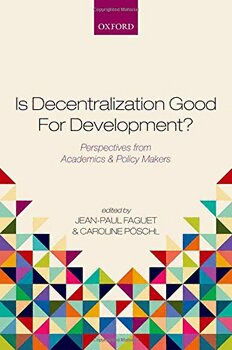
Is decentralization good for development? : perspectives from academics and policy makers PDF
Preview Is decentralization good for development? : perspectives from academics and policy makers
OUPCORRECTEDPROOF–FINAL,16/7/2015,SPi Is Decentralization Good for Development? OUPCORRECTEDPROOF–FINAL,16/7/2015,SPi OUPCORRECTEDPROOF–FINAL,16/7/2015,SPi Is Decentralization Good for Development? Perspectives from Academics and Policy Makers Jean-Paul Faguet and Caroline Pöschl 1 OUPCORRECTEDPROOF–FINAL,16/7/2015,SPi 3 GreatClarendonStreet,Oxford,OX26DP, UnitedKingdom OxfordUniversityPressisadepartmentoftheUniversityofOxford. ItfurtherstheUniversity’sobjectiveofexcellenceinresearch,scholarship, andeducationbypublishingworldwide.Oxfordisaregisteredtrademarkof OxfordUniversityPressintheUKandincertainothercountries ©thevariouscontributors2015 Themoralrightsoftheauthorshavebeenasserted FirstEditionpublishedin2015 Impression:1 Allrightsreserved.Nopartofthispublicationmaybereproduced,storedin aretrievalsystem,ortransmitted,inanyformorbyanymeans,withoutthe priorpermissioninwritingofOxfordUniversityPress,orasexpresslypermitted bylaw,bylicenceorundertermsagreedwiththeappropriatereprographics rightsorganization.Enquiriesconcerningreproductionoutsidethescopeofthe aboveshouldbesenttotheRightsDepartment,OxfordUniversityPress,atthe addressabove Youmustnotcirculatethisworkinanyotherform andyoumustimposethissameconditiononanyacquirer PublishedintheUnitedStatesofAmericabyOxfordUniversityPress 198MadisonAvenue,NewYork,NY10016,UnitedStatesofAmerica BritishLibraryCataloguinginPublicationData Dataavailable LibraryofCongressControlNumber:2015932090 ISBN 978–0–19–873750–6 Printedandboundby CPIGroup(UK)Ltd,Croydon,CR04YY LinkstothirdpartywebsitesareprovidedbyOxfordingoodfaithand forinformationonly.Oxforddisclaimsanyresponsibilityforthematerials containedinanythirdpartywebsitereferencedinthiswork. OUPCORRECTEDPROOF–FINAL,16/7/2015,SPi Foreword Decentralization is everywhere around us. Throughout the developing and developedworlds,boththearchitectureofthestateandthedeeperrelationship between citizens and governments are being re-shaped by decentralization, devolution,andoutrightsecession.Thirtyyearsago,academicresearchersand organizationsliketheWorldBankandUnitedNationsmarveledatthenumber of decentralization programs across the world. Since then the number of reformshasgrownandgrown. Decentralizationchangescountriesinbig,deep,andlastingwaysbecauseit changes not just financial flows and formal structures of authority, but the fundamentalincentivesthatpublicofficialsmustrespondto.Inacentralized system,officials’incentivesare“upward-looking”inthesenseofresponding to the wishes and priorities of officials higher up in government. Their per- formanceisjudged,andtheyarerewardedornot,accordingtohowwellthey servetheagendasofsuperiorbureaucrats.Inadecentralizedsystem,officials’ incentives are pointed firmly downwards to the citizens and voters who electedthem.Theyarejudgedbycitizens,andtheircareertrajectorydepends onsatisfyingenoughofthemthatvoterschoosetoreturnthemtooffice.By changingsuchdeepincentivesthatoperatethroughoutgovernment,decen- tralization sets in motion a dynamic that leads to long-term, fundamental changesinpublicofficials’behavior,andpublicsectordecisionsandoutputs, aswellastheunderlyingrelationshipbetweengovernorsandthegoverned. Thesearenotabstracttheoreticalpoints,butreal,tangible,definingfeatures of countries, states, and economies. Just look at the raucous, diverse, colorful—but also stable and legitimate—democracy that federalism under- pins in India; compare it to the winner-take-all, brittle, chronically unstable governments that six decades of centralization have bestowed on Pakistan. Thesecountriesdifferinwaysotherthandecentralizationofcourse.Butitis usefultorememberthattheyweregovernedforcenturiesbythesameBritish colonial administration, and their politics diverged only at independence when one became a federal, and the other a unitary, state. Think also of Germany vs. the UK, orSpanish South America vs. Brazil,and consider how variations in centralization help shape national economies and the spatial distributionofeconomicactivity. OUPCORRECTEDPROOF–FINAL,16/7/2015,SPi Foreword Bigreformshavespawnedabigliteraturededicatedtoevaluatingdecentral- ization’s effects, numbering in the hundreds of published works and thou- sandsofagencyreports.Buttheyhavemostlyignoredquestionsconcerning governance,politicalcompetition,stability,andlegitimacy,whicharehighly consequentialbutmethodologicallydifficulttoaddress,infavorofeasier-to- measure, technocratic issues like public investment levels, inflation, fiscal deficits, and education and health attendance. Such second-order issues are alsoimportantandworthyofstudy,ofcourse.Buttheshiftinfocusawayfrom themostimportanteffectsofreformhashadalessobvious,morepernicious effectonourunderstandingofdecentralization.Ithaspushedresearchersand thinkers toassume theperspective ofasocialplanner or policyanalyst—the disinterested, benevolent dictator who maximizes some concept of good in society,beitwealth,health,orsomeothermeasureofwell-being. Withoutdoubtthisisausefulwaytoapproachsuchquestions.Butitalso serves to divorce a huge literature from the principal concerns of policy makers and politicians: Will decentralization increase or decrease my power and control? Will itget me re-elected? Will ithelp or harm my party’s long- termprospects?Nottomentiontheprincipalprioritiesofcitizens:Willdecen- tralization increase or decrease political stability? violence? citizens’ rights andfreedoms?prosperity?inequality?Theseare,indeed,themainthingsthat we as development specialists, thinkers, and indeed citizens should be con- cerned withtoo. Insodoing, theshiftin focusmakesthe majority ofdecen- tralization studies—regardless of how rigorous and technically competent many undoubtedly are—less interesting and much less relevant to precisely those people who must lead the difficult changes required to decentralize anycountry. When policy makers approach academics for advice about a major, risky reformthatseekstochangetheshapeofgovernment,answeringintermsof itssecond-andthird-ordereffectsisastrangethingtodo.Whentheseeffects areadditionallythingsthatpolicymakerscarelessabout,theeffectisdown- rightperverse. Thisbookisuniqueinthatitturnsthetablesonanentirefield.Itexamines decentralization through the eyes of policy-making politicians, but with the methodological rigor and theoretical clarity of academics, asking first: Why wouldpoliticianswanttodoit?Andiftheydid,howwouldtheydoit?Itthen analyzes key issues of governance such as democracy, stability, inclusivity, andstatestrength.Afurtherthreechaptersdrawthelessonsoffourdecadesof reformthroughouttheworldonhowbesttodesigntax,transfer,andexpend- ituresystems.Lastlyitreturnstomoretraditional,technocraticissues,asking: What happens after reform is implemented? These last four chapters update ourknowledgeofdecentralization’seffectsonhealth,education,anti-poverty vi OUPCORRECTEDPROOF–FINAL,16/7/2015,SPi Foreword programs, etc. using evidence from twelve countries across Africa, Asia, and LatinAmerica. The editors have achieved this synthesis of academic and policy-making perspectives by carefully choosing and pairing authors to write on specific topics. While a few authors are “pure” academics (e.g. Myerson) or “pure” policymakers(e.g.Aiyar),mosthaveafirmbaseinonecampbutmaintainan ongoing,vigorouspracticeintheother(e.g.Bossert,Faguet,Khan,etc.).Five chaptersarewrittenbyacombinationofpolicymaker(s)andacademic(s),four chapters by individuals who significantly span that frontier, two by “pure” academics,andtwoby“pure”policymakers. ThisbookisaproductoftheInitiativeforPolicyDialogue’sDecentralization TaskForce,andwasfirstconceivedataconferenceheldatColumbiaUniver- sityinNewYorkin2009.Althougheachchapterhasnamedauthors,thereisa broader sense in which the volume reflects the collective thinking of all involved. Bringingpolicymakersandacademicstogethertothink,discuss,andwrite aboutcommonthemeshasbeenneithereasynorstraightforward.Thesetwo constituencies use different languages, are motivated by different concerns, andhavecompletely,utterlydifferentworkstyles.Theauthorsaretrainedin economics, political science, public health, and philosophy, and include women, men, old, young, Asians, Europeans, and North and South Ameri- cans.Butthese differences were asnothingcomparedtothe policy-making– academic divide. Breaching it took five years and an enormous amount of work,energy,anddedication. I hope readers will agree that the effort was worthwhile. The result of my colleagues’ labors is an unparalleled synthesis of theory and practice, an analyticalmemoryofkeysuccessfulandunsuccessfulreforms,andapractical guideforthosewhowoulddecentralizetheircountries. JosephE.Stiglitz NewYork,September2014 vii OUPCORRECTEDPROOF–FINAL,16/7/2015,SPi OUPCORRECTEDPROOF–FINAL,16/7/2015,SPi Contents ListofFigures xi ListofTables xiii ListofContributors xv 1. IsDecentralizationGoodForDevelopment?Perspectives fromAcademicsandPolicyMakers 1 Jean-PaulFaguetandCarolinePöschl PartI. Decentralization,Stability,andthe StrengtheningoftheState 2. “WhyIDecentralizedBolivia” 31 GonzaloSánchezdeLozadaandJean-PaulFaguet 3. BreakingtheCountercyclicalPatternofLocalDemocracy inPakistan 68 AliCheema,AdnanQ.Khan,andRogerB.Myerson 4. InclusiveGovernanceforInclusiveDevelopment:TheHistory, Politics,andEconomicsofPanchayatRaj 80 ManiShankarAiyar 5. IsLatinAmericaonaPathtoSustainableFiscalDecentralization? 109 MatteoGrazziandFidelJaramillo 6. DoesDecentralizationStrengthenorWeakentheState? AuthorityandSocialLearninginaSuppleState 129 Jean-PaulFaguet,AshleyM.Fox,andCarolinePöschl PartII. DesigningDecentralization:Taxes, Transfers,andExpenditures 7. AFiscalInterestApproachtoSubnationalGovernmentIncentives: ImplicationsfortheDesignofTaxandTransferSystems 163 CarolinePöschlandBarryR.Weingast
